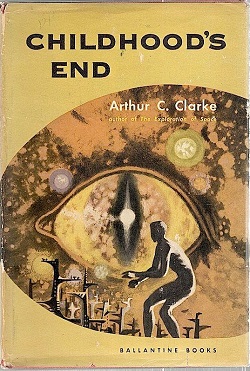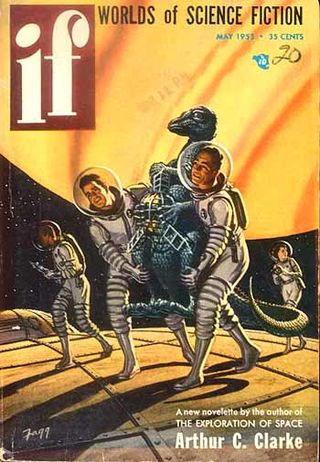Related Research Articles

Childhood's End is a 1953 science fiction novel by the British author Arthur C. Clarke. The story follows the peaceful alien invasion of Earth by the mysterious Overlords, whose arrival begins decades of apparent utopia under indirect alien rule, at the cost of human identity and culture.

Prelude to Space is a science fiction novel written by British author Arthur C. Clarke in 1947. It appeared for the first time in 1951 as a paperback from World Editions Inc, as number three in its series of Galaxy novels. Sidgwick & Jackson published it in the UK in 1953, followed the next year by a United States hardcover edition from Gnome Press and a paperback from Ballantine Books.

Reach for Tomorrow is a 1956 collection of science fiction short stories by British writer Arthur C. Clarke. All the stories originally appeared in a number of different publications.
Edmund Cooper was an English poet and prolific writer of speculative fiction, romances, technical essays, several detective stories, and a children's book. These were published under his own name and several pen names.

Tales from the White Hart is a collection of short stories by science fiction writer Arthur C. Clarke, in the "club tales" style.

The Collected Stories of Arthur C. Clarke, first published in 2001, is a collection of almost all science fiction short stories written by Arthur C. Clarke. It includes 114 stories, arranged in order of publication, from "Travel by Wire!" in 1937 through to "Improving the Neighbourhood" in 1999. The story "Improving The Neighbourhood" has the distinction of being the first fiction published in the journal Nature. The titles "Venture to the Moon" and "The Other Side of the Sky" are not stories, but the titles of groups of six interconnected stories, each story with its own title. This collection is only missing a very few stories, for example "When the Twerms Came", which appears in his other collections More Than One Universe and The View from Serendip. This edition contains a foreword by Clarke written in 2000, where he speculates on the science fiction genre in relation to the concept of short stories. Furthermore, many of the stories have a short introduction about their publication history or literary nature.

Ian Keith Ballantine was an American publisher who founded and published the paperback line of Ballantine Books from 1952 to 1974 with his wife, Betty Ballantine. The Ballantines were both inducted by the Science Fiction Hall of Fame in 2008, with a shared citation.

"Jupiter Five" is a science fiction short story by British writer Arthur C. Clarke, first published in the magazine If in 1953. It appeared again in Clarke's collection of short stories Reach for Tomorrow, in 1956, and deals with the detection and exploration of an old spaceship from outside the Solar System.
"Time's Arrow" is a science fiction short story by British writer Arthur C. Clarke, first published in 1950 in the first issue of the magazine Science Fantasy. The story revolves about the unintended consequences of using time travel to study dinosaurs.

"The Possessed" is a science fiction short story by British writer Arthur C. Clarke, first published in 1953.

Sir Arthur Charles Clarke was an English science fiction writer, science writer, futurist, inventor, undersea explorer, and television series host.
The following is a list of works by Arthur C. Clarke.
"Technical Error"" is a science fiction short story by English writer Arthur C. Clarke. It was published in 1950 under the title "The Reversed Man" and appeared again in Clarke's collection of short stories Reach for Tomorrow, in 1956.
"Big Game Hunt" is a science fiction short story by the British writer Arthur C. Clarke, first published in 1956. This story describes the efforts of an eccentric professor to study the electrical circuitry of the brain. After using his research to develop robotic creatures, he then tries to use electrical stimulation of the brain to control the behavior of animals. The professor's work is discovered by a wildlife photographer, who tries to exploit it to film a giant squid. While their attempt is initially successful, the equipment blows a fuse, and the squid kills both scientist and photographer. The story was also published as "The Reckless Ones".

"The Ultimate Melody" is a science fiction short story by British writer Arthur C. Clarke, first published in 1957. The story describes the work of a physiologist who attempts to discover the connections between music and the rhythms of the electrical pulses in the brain. He believed that all "hit-tunes" were merely poor reflections of an "ultimate" melody, and he built a machine to search for this tune. By the end of the story, he succeeds, but the influence of the melody is so powerful that he becomes completely catatonic.
"Moving Spirit" is a science fiction short story by British writer Arthur C. Clarke, first published in 1957. The story within a comic story is narrated by Harry Purvis, who is called to assist a scientist relative of his in a trial. The scientist has been brought before the local magistrate's court on charges of illegally distilling liquor. Purvis manages to get him acquitted, by arguing that he was actually working on a fictional "osmotic bomb". Unfortunately Purvis accidentally demonstrates this bomb by exploding it in the courtroom, thus conveniently destroying all the evidence. However, the scientist is almost immediately booked for driving under the influence due to the strong smell of alcohol from his wet clothes.

"The Man Who Ploughed the Sea" is a science fiction short story by British writer Arthur C. Clarke, first published in 1957. The story within a story is narrated by Harry Purvis, who recalls a holiday spent submarining off of the Florida Keys. While there, he happens to witness a meeting between two wealthy and talented scientists, one of whom has designed a method to extract trace elements from seawater. He trades his secret to the other in exchange for the other's fancy yacht, but it turns out that the process is not yet commercially viable.

"The Reluctant Orchid" is a science fiction short story by British writer Arthur C. Clarke, first published in 1956, and later anthologized in Tales from the White Hart. Like the rest of the collection, it is a frame story set in the fictional "White Hart" pub, where the fictional Harry Purvis narrates the secondary tale.
"Cold War" is a science fiction short story by British writer Arthur C. Clarke, first published in 1956, and later anthologized in Tales from the White Hart. Like the rest of the collection, it is a frame story set in the fictional "White Hart" pub, where Harry Purvis narrates the secondary tale.
"What Goes Up" is a science fiction short story by English writer Arthur C. Clarke, first published in 1956, and later anthologized in Tales from the White Hart. Like the rest of the collection, it is a frame story set in the fictional White Hart pub, where Harry Purvis narrates the secondary tale. The title is a reference to the common phrase "What goes up must come down".
References
- ↑ Bibliography: The Forgotten Enemy. Internet Speculative Fiction Database , retrieved June 12, 2011
- ↑ Arthur C. Clarke: Reach for Tomorrow . Ballantine Books, New York 1956, p. IV
- ↑ Arthur C. Clarke: Reach for Tomorrow. Ballantine Books, New York 1956, p. 43
- ↑ Arthur C. Clarke: Reach for Tomorrow. Ballantine Books, New York 1956, p. 41
- ↑ Arthur C. Clarke: Reach for Tomorrow. Ballantine Books, New York 1956, p. 42
- ↑ Arthur C. Clarke: Reach for Tomorrow. Ballantine Books, New York 1956, p. 47
- ↑ Arthur C. Clarke: Reach for Tomorrow. Ballantine Books, New York 1956, p. 41-47